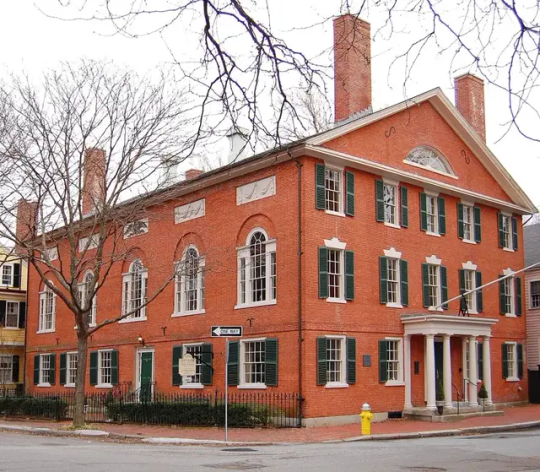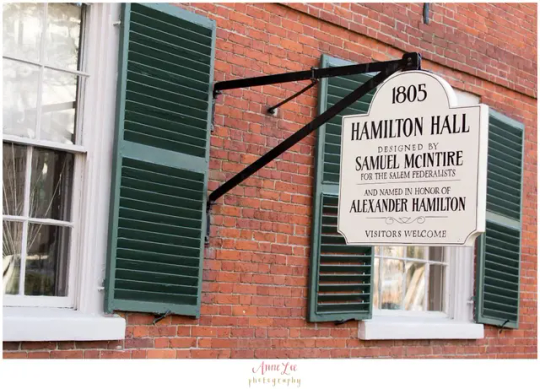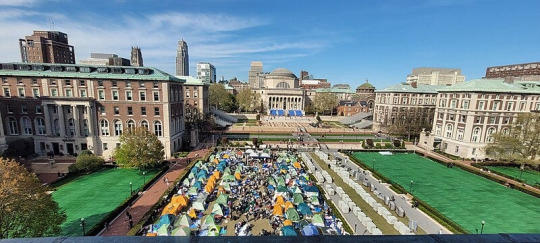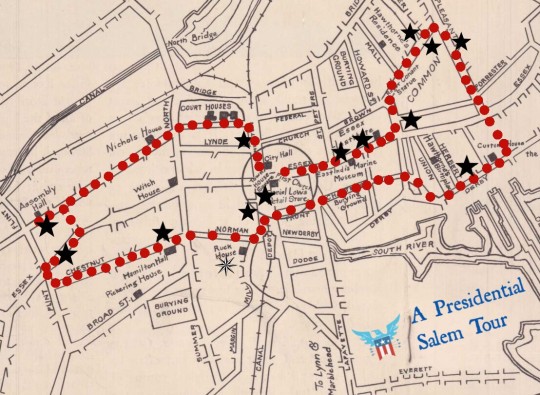#Hamilton Hall
Text
that clip of the pro-palestinian protestors waving the "Hind's Hall" banner over hind hall (formerly called hamilton hall) is REALLY powerful. actually reminds me of the soviet photo op of the USSR flag waving over the german parliament building
#gaza#free gaza#free palestine#geopolitics#stop genocide#stop arming israels#stop israel#hind hall#hamilton hall#columbia university#palestine#palestine protest#protest#columbia
79 notes
·
View notes
Text





Source
#columbia university#title vi#joseph slaughter#jeanine d'armiento#liars#hamilton hall#encampment#susan howley#joseph howley
33 notes
·
View notes
Text
youtube
24 notes
·
View notes
Text


Hamilton Hall
Salem, Massachusetts
For over two hundred years Hamilton Hall on Salem’s scenic Chestnut Street has served as a gathering place for the community. The building dates to 1805, when Samuel McIntire was commissioned to design a meeting place for Salem’s Federalist Party. It was named to honor Federalist Party leader Alexander Hamilton.
As the 19th century progressed, the Hall became an ideal place for dance studios due to Samuel McIntire’s signature spring floors. Lorenzo Papanti, a master dance instructor from Boston regularly held classes at Hamilton Hall, attended by the children of Salem’s elite. The dance classes later gave way to grand debutante presentations and balls. In the 20th century, local instructors Henry O. Upton and Harriet James continued the tradition of providing lessons at the Hall, which lasted into the 1970s.
One of the Hall’s oldest traditions and its largest fundraiser is the annual Christmas Week Dance, which can be traced back to the 1880s. Money is also raised for the Hall through a lecture series sponsored by the Ladies Committee. The series has been in place for seventy years and features a variety of speakers, discussing domestic and foreign affairs.
In 1970, Hamilton Hall was designated as a National Historic Landmark and today is regularly rented for banquets, weddings and, as its original intention, a meeting place.
There have been claims of seeing an apparition of a male on the stairwell, then just disappear. Visitors have claimed to have felt unusual cold spots throughout the house.
#Hamilton Hall#ghost and hauntings#paranormal#ghost and spirits#haunted locations#haunted salem#myhauntedsalem#salem massachusetts
23 notes
·
View notes
Text

If you didn't see this coming from the people screaming support for terrorist violence and "at any cost," you're naive and delusional.
Let's be very clear: they were never entitled to commandeer university grounds. They don't have that right. Nor do they have the right to interfere with where other students go, either by blockading or by intimidation. When none of this was addressed, it set a constant build-up of self-importance and moral absolutism that inevitably boils over.
#Columbia University#hamas supporters#terrorism supporters#student terrorists#protests#student protests#student violence#pro terrorism#pro hamas#hamas#Hamilton Hall#terrorist scarf#islam#islamic terrorism#religion is a mental illness
12 notes
·
View notes
Text
Shruti Rajkumar at HuffPost:
The Manhattan district attorney dropped the charges for more than half of the Columbia University protesters who were arrested in April during a pro-Palestine demonstration on campus.
Hundreds of students seized Hamilton Hall, a building on Columbia’s campus in Manhattan, on April 30 amid a nationwide mobilization of protests on college campuses to protest Israel’s attacks on Palestinians and called on their institutions to divest from Israel.
The protests revolve around Israel’s ongoing offensive against the militant group Hamas in Gaza, after it had launched a deadly surprise attack against Israel on Oct. 7. Since then, Israel’s ongoing strikes have killed over 30,000 people in Gaza and displaced most of the population.
On Thursday, Manhattan district attorney’s office, dismissed the charges against 31 out of 46 protestors who were arrested on April 30 at the college’s pro-Palestine demonstrations due to lack of evidence, among other reasons. Those who were students or employed at Columbia are facing ongoing disciplinary hearings.
All the individuals whose cases were dismissed were students or staff at Columbia, Barnard or Union Theological Seminary, the DA office told HuffPost.
James Carlson, another defendant who is unaffiliated with Columbia University, faces charges for trespassing and burning an Israeli flag. According to NBC News, he has two open cases against him involving separate charges.
Some individuals — two students and 12 individuals who were not staff or students at Columbia — were offered a proposal to have their charges dropped as long as they aren’t arrested within the next six months, NBC News reported. Prosecutors said that the individuals’ nonexistent criminal history and the limited video or surveillance footage of what happened inside Hamilton Hall were factors in the dismissal of their charges.
Good news! Manhattan DA Alvin Bragg drops charges for 31 out of the 46 protesters that were arrested in a pro-Palestine demonstration at Columbia University that had hundreds of protesters seizing Hamilton Hall.
#Campus Protests#Israel/Hamas War#Palestine#Israel#Alvin Bragg#Manhattan#Columbia University#Hamilton Hall#Union Theological Seminary#Barnard College
8 notes
·
View notes
Text
this is what really happened in Hind's Hall the night the militarized police were sent in to attack student protestors in the name of "student safety"
instagram
#Ajplus#columbia university#columbia#palestine protests#student protests#hind's hall#Hamilton hall#Palestine#free palestine#Instagram
6 notes
·
View notes
Text
If you want to listen to WKCR’s on-campus coverage of the events at Columbia, you can listen to the hour-long recording here:
I’d highly recommend it, they call in to question the unsubstantiated narrative of ‘outside agitators’ that Columbia admin, NYPD, the mayor’s office, and a lot of media outlets are parroting without evidence.
3 notes
·
View notes
Text
Activistas entrenados en Cuba detrás de las protestas contra Israel en la universidad de Columbia
“El régimen de Cuba cuenta con activistas preparados para desestabilizar regiones como la América Latina y Estados Unidos, lo cual se corrobora recientemente”
Un reciente informe revela que activistas cercanos al régimen comunista de Cuba se encuentran detrás de las protestas anti Israel que irrumpieron en el Hamilton Hall de la Universidad de Columbia con el objetivo de reavivar los sangrientos…

View On WordPress
#activistas entrenados por Cuba#conocer cuba noticias#disturbiós en New York#Hamilton Hall#Manolo de los Santos#noticias de Cuba#protestas en Columbia#régimen de Cuba
0 notes
Text
THE CAMPUS CRUCIBLE OF ISLAMIC HOLY WAR -- The student mobs threaten not just the Jews but America and civilization itself
Columbia University “Gaza Solidarity Encampment”
Events at Columbia University and on other American campuses have left many people open-mouthed in shock and horror.
Overnight last night, a mob stormed Columbia’s Hamilton Hall. Masked men dressed in black used hammers and other tools to break in through the windows, barricading entry to the building with tables, chairs and a human chain. They…

View On WordPress
#Beijing#Charles Burton#Columbia University#Conservative Party#England#Estonia#Final Solution#Fiona Hill#Gaza Solidarity Encampment#Global South#Gordon G. Chang#Hamas#Hamilton Hall#house divided#intifada#Islamic fanaticism#Jews#Joe Biden#Labor Party#London#Melanie Phillips#Minouche Shafik#Motherhoodslim Bru#Palestine#Rishi Sunak#Talinn#Tories#two-state solution#US National Security Council#Vietnam
1 note
·
View note
Text
A Salem Walking Tour for Presidents Day
Sorry I’m a little late with this Presidents Day post, but I woke up this morning with an earnest desire to take a walk around Salem, an urge I haven’t felt for quite some time. And since it was Presidents Day, I had a walking theme, which is always nice. We had a lovely weekend in New Hampshire with old friends and a equally lovely dinner with my brother and brother-in-law when we returned last…

View On WordPress
#Architecture#Hamilton Hall#Hawthorne Hotel#Historic Preservation#holidays#Peabody Essex Museum#Presidents#Presidents Day#Salem Common#Walking Tours
0 notes
Text
by Dion J. Pierre
Columbia University punished very few of the students who were involved in occupying an administrative building and staging a riot which prompted the university, fearing an outbreak of racial violence, to revoke a Jewish professor’s access to campus, according to a new report.
In April, an anti-Zionist group occupied Hamilton Hall, forcing then-university president Minouche Shafik to call on the New York City Police Department (NYPD) for help, a decision she hesitated to make and which led to over 108 arrests. According to documents shared on Monday by the US House Committee on Education and the Workforce, 18 of the 22 students slapped with disciplinary charges for their role in the incident remain in “good standing” despite the university’s earlier pledge to expel them. Another 31 of 35 who were suspended for illegally occupying the campus with a “Gaza Solidarity Encampment” remain in good standing too.
“The failure of Columbia’s invertebrate administration to hold accountable students who violate university rules and break the law is disgraceful and unacceptable,” education committee chair Rep. Virginia Foxx (R-NC) said in a blistering statement. “More than three months after the criminal takeover of Hamilton Hall, the vast majority of the student perpetrators remain in good standing. By allowing its own disciplinary process to be thwarted by radical students and faculty, Columbia has waved the white flag in surrender while offering up a get-out-of-jail-free card to those who participated in these unlawful actions.”
Columbia has sent mixed messages about its intention to discipline pro-Hamas demonstrators who wreaked havoc on campus this past spring semester.
Last month, Shafik pledged that the university would launch an ambitious educational effort to combat antisemitism on campus, but she presided over a decision not to fire four administrators who participated, according to her own words, in a text message exchange which “touched disturbingly on ancient antisemitic tropes.” In June, it agreed, in settling a civil lawsuit out of court, to hire “Safe Passage Liaisons” who will protect Jewish students from racist abuse. At the same time, however, Columbia is currently investigating a professor who criticized the university’s harboring of students who proclaimed support for Hamas and called for a genocide of Jews in Israel.
“Breaking into campus buildings or creating antisemitic hostile environments like the encampment should never be given a single degree of latitude — the university’s willingness to do just that is reprehensible,” Foxx added in Monday’s statement.
11 notes
·
View notes
Text
Ok I get that you should not make fun of people interpretation of characters and that character playlist are not that deep but whoever put a god damn Taylor swift song on a spiderpunk playlist should never be allowed near spotify ever again
#No tiktok user Spiderpunk would not listen to mother mother#or lemon demon#or weezers#or katy perry#or tally hall#or tv girl#or Mariah Carey#or hamilton#or heathers#or the will smith song from the live action Aladdin#or roar#or the lovejoys#or the arctic monkeys#or liana flores#spiderman atsv#spiderman across the spiderverse#spider punk#across the spiderverse#hobie brown#spiderverse#spiderman
4K notes
·
View notes
Text
You do realize that breaking into and occupying an administrative building while destroying property and wearing costumes is exactly what the rioters did on the January 6th attempted insurrection, right? Naming specific governing officers they hate, saying they “can’t hide,” claiming they’re justified because they’re the good guys fighting against the evil people in power.
The January 6th rioters were crazy because what they did was crazy. Not just because they thought Trump won the election.
I get that it’s university government buildings rather than US government buildings, but it’s a really, really clear echo. These protestors are not better just because you think they’re right.
#columbia university#mostly about that because Hamilton Hall is an admin building#but the others are also similar riots#i/p#i/p conflict#israel#gaza#Palestine#antisemitism#college antisemitism#leftist antisemitism#jewish#jumblr#discussion#Columbia
326 notes
·
View notes
Text
Emily Tamkin for The UnPopulist:
Unable to attend last December’s explosive congressional hearing probing antisemitism on college campuses along with Harvard’s Claudine Gay, University of Pennsylvania’s Liz Magill, and MIT’s Sally Kornbluth due to prior arrangements to attend a climate conference, Columbia University President Minouche Shafik came before Congress on April 17 and was questioned for over three hours. Shafik insisted throughout the hearing that Columbia had been taking antisemitism seriously, at one point even listing the various ways the university has meaningfully addressed this issue under her watch:
[Our actions included support for students, enhanced reporting channels for incidents, hiring additional staff to investigate complaints, developing new policies on demonstrations, holding listening forums to model respectful behaviors, launching educational programs, and forming a task force of our senior leaders to propose solutions to antisemitism.]
The day after she testified before Congress, Shafik, Columbia’s first woman and first Arab president, called the police to campus to break up a student encampment set up to protest Israeli actions in Gaza. Over 100 students participating in the encampment were arrested, in addition to being suspended by the university.
“The president’s decision to send riot police to pick up peaceful protesters on our campus was unprecedented, unjustified, disproportionate, divisive, and dangerous,” Christopher Brown, a professor in the history department at Columbia University, told the crowd during a faculty demonstration. “I’m here because I am so concerned with what has happened at this university, with where we are now, and with where we are going,” said Brown, who indicated that this was the first time he’d spoken into a microphone at a protest of any kind. Congress wants to dictate disciplinary and educational decisions to Columbia; this is not the job of Congress, he said. Other faculty I interviewed after the hearing felt similarly.
All of this—the testimony, the protests, the call to the police, the endurance of the protests—is national news. The students are demanding that Columbia divest (that is, that Columbia withdraw from investments that students say are profiting from Israel’s military actions) and there are chants on campus—and off campus by people who are not students—that have made some Jewish students uncomfortable. Some—notably Rabbi Elie Buechler, who directs Columbia University’s Orthodox Union-Jewish Learning Initiative on Campus—have even said it is not safe for Jews at Columbia.
Shafik’s handling of the situation has managed to enrage faculty and students and those on the left who find it shocking that Shafik called police to campus while also enraging those who want the encampment gone. As of this writing, it remains, still standing even after Shafik imposed a removal deadline of 2 p.m. on Monday under threat of suspension. Faculty created a protective rim around their students. Early Tuesday morning, some students took over Hamilton Hall, a building on campus.
Some of the discourse about the campus protests, at Columbia specifically and throughout the country more generally, has made it sound as though the protests are motivated by antisemitism and seek to endanger Jewish students. Israeli Prime Minister Benjamin Netanyahu went as far as to liken the protests to Nazi Germany. Leaving aside that it is grossly ahistorical to conflate student protests against a war carried out by the Jewish state to a historical episode in which the state carried out violence and discrimination against Jews, this narrative is simplistic and, more than that, wrong. The protests are an opportunity to remind ourselves of the function of universities; that no identity is a monolith; and why students are moved to protest in the first place.
Columbia’s Only Jurisdiction Is Its Campus
Some have conflated action outside Columbia’s gates with action inside the campus. To the students who have to hear “go back to Poland” or “the 7th of October is going to be every day for you!” outside their campus, this may well be a distinction without a difference. And the truth is that Columbia, as an urban campus, bumps up against the real world and real people (including, yes, antisemites) who are not bound by the student code of conduct and are not in community with their fellow students in the same way. This is true not only of pro-Palestine protests, but also pro-Israel protests: Some in the crowd yelled “Go back to Gaza!” from outside the gates on April 26. That’s why members of Columbia’s Policy and Planning Committee of the Faculty of the Arts and Sciences noted in a letter to the media: “It is because of this respect for all Columbians that we have been so distressed by reports that conflate on-campus protests with the actions of bad actors from outside our community.”
To the extent that there are specific threats made against or harm done to Jewish students at Columbia by their fellow students, those students should be specifically disciplined. This, in fact, is what the university eventually did in the case of the student who said in a January video that “Zionists don’t deserve to live” and that people should “be glad, be grateful that I am not just going out and murdering Zionists.”
It is true that, while student protesters are protected by the First Amendment, universities are within their rights to regulate demonstrations on their campuses. It is also true that, as these particular demonstrations are happening on university grounds, student and faculty safety should be paramount. The university has both a higher obligation to academic freedom and a higher obligation to protect the safety of all students. There are moments, however, when it may be hard to distinguish between protests and veiled violence: for example, people within the encampment at Columbia formed a human chain to stop the movement of alleged “Zionists” to protect the privacy of the encampment. That wasn’t violence, exactly, but arguably did contain within it a threat (what happens if you try to go past the chain?). Still, balancing the two, expression and safety, should be the point of a university’s disciplinary policies—not silencing a movement or chilling speech because some disagree with or are upset by its aims, or to privilege one preferred foreign policy outcome over another.
Some Jewish students, for example, may not like or even feel uncomfortable because of calls like “from the river to the sea” or calls for the elimination of the Jewish state and establishment of one binational state. However, the current policy of the Israeli government is that there will not be a Palestinian state between those two bodies of water, and that, in the West Bank, Palestinians should live under military rule while Jews live under civil rule; this, too, is surely upsetting to some students.
[...]
Jewish Faculty and Students Are Not a Monolith
There is also the reality that Jews ourselves, at both an institutional and personal level, do not agree on what is and is not upsetting to Jews, as we do not agree on what is—and isn’t—antisemitic speech. There are thus Jewish faculty at Columbia writing against the weaponization of antisemitism and Jewish faculty asking that the university send in the National Guard to shut down the protests. (For that matter, faculty disagree even over whether it was appropriate to call for classes to go remote.)
This division is reflected not only among faculty, but also among students. There are Jewish students who feel isolated and unsafe because of the protests; Jewish students who support the goals of the protest but worry about antisemitic rhetoric and want to see it more sharply denounced; and Jewish students who are taking part in the protest and indeed held their Passover Seder on the campus lawn. This is to say nothing of the Jewish students covering the protests for campus publication or Jewish students who don’t engage much at all with the issue of Israel.
[...]
Protests Fulfill, Rather Than Challenge, the Purpose of Universities
It is important to remember that the population under discussion here—students—is ostensibly on campus in the first place to learn and think and challenge themselves and, most importantly, each other. It matters that they are able to do so safely; but it also matters that they are able to do so at all.
In that multifaceted educational environment, in which they’re learning and thinking and challenging themselves, they might decide to engage with what is happening in the world around them. They might, for example, go from a history class to reading about the looming famine in Gaza, or from an art history seminar to learning of the physical destruction of Palestinian culture sites, or from a lecture on political science to a report that over 30,000 people have died in Gaza over the course of this war, or from a literature class to seeing that an Israeli strike killed the daughter of Palestinian poet Refaat Alareer, who was himself killed by an Israeli airstrike back in December. And perhaps this causes its own kind of discomfort and sense of pain. (On the other hand, some students might leave a history or political science or language class and decide after listening to the protesters that they do not support calls to end study abroad programs with Israeli academic institutions because they decide that that would be counterproductive to getting a full understanding about the conflict or the region.)
I have had some people tell me that they do not think the protests are helping the people in Gaza, and in a sense this is true. The student protesters are not in the White House. They are not in the halls of Congress. They are not setting policy. But those on the lawns of Columbia and other campuses seem to me, more than anything else, to be trying to do what they can with the limited power they have: show solidarity with Palestinians in Gaza and push their own university to divest. The protests, then, are also an expression of student pain. And that pain, too, needs to be able to be expressed, not only for the sake of our foreign policy debates, and not only for the sake of academic freedom at Columbia and elsewhere, but also for our democracy.
Emily Tamkin wrote in The UnPopulist that shutting down anti-Gaza Genocide (aka Pro-Palestinian) protests are counter-productive to a college's mission to learn.
Also, Tamkin noted that Jewish students and faculty are split over the issue of college campus protests, with some favoring them and some condemning them as "antisemitic."
#Gaza/Israel Conflict#Israel/Hamas War#Israel#Ceasefire NOW Protests#College#Palestine#Israel/Palestine Conflict#Israel Apartheid#Emily Tamkin#The UnPopulist#Minouche Shafik#Antisemitism#Hamilton Hall#Columbia University#Liz Magill#Claudine Gay#Campus Protests
6 notes
·
View notes
Text
Do you think this is Vicky? Spraying Axl's hair?

gif credit to doubletalkinjives
Yeah. It's got to be Vicky. She looks great! And of course so does Axl. In my opinion, the coolest he ever looked. Vicky did a great job on your hair, Ax. She knew what she was doing. I think she did a great job getting you guys noticed too. Sexy, Axl. Very sexy. Hot, Vicky. Very hot.
#gnr#axl gnr#vicky hamilton#axl rose#axl rose fans#guns n roses#guns n' roses#slash#izzy stradlin#steven adler#duff mckagan#l.a. street scene festival 1986#rock n roll history#rock n roll music#rock#rock music#glam rock#classic rock#hard rock#rock n roll hall of fame#rock and roll#glam#glam punk#american rock#los angeles#l.a. rock#american bands#sexxxy axxxl
69 notes
·
View notes